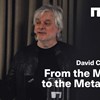really
Beyond the Concept of Anonymity: What is Really at Stake?
in: Big Data and Democracy. Ed: Macnish, K. & J. Galliott (2020) AbstractThe aim of this paper is to discuss anonymity and the threats against it—in the form of deanonymization technologies. The qu
In Sweden we shake hands – but are we really?
Sociologisk Forskning, vol 54, no 4, pp 377–381. Abstract Motivated by a recent controversy over handshaking, a survey of the personal networks of young Swedes (n=2244) is used to describe greeting prac
Actions and networks: Sociology that really matters (to me)
2008. Sociologica 1(1) 1-18.

David Chalmers: From the Matrix to the Metaverse (With a Little Help From AI)
Part of the Problems of Philosophy in VR-conference hosted by the Institute for Futures Studies in May 2023. David Chalmers' book Reality+ takes as its starting point the recent advances in AI and com
Kasper Lippert-Rasmussen: Affirmative Action: The Key Arguments
Professor Kasper Lippert-Rasmussen, Department of Political Science, Århus University.Abstract Many think affirmative action is (un)justified. But does it really make sense to have views about affirmat
Policy responsiveness and democratic anger
A growing number of voters in Europe abstain from their right to vote in democratic elections. Most of them are citizens with low socio-economic status. The gap in political participation is most pron

Adina Preda: Can there be positive human rights?
Research seminar with Adina Preda, Associate Professor of Philosophy at Trinity College Dublin. Abstract This paper aims to establish that there can be human rights to socio-economic goods or services
New report on the effects of projects financed by the European Social Fund
The European Social Fund (ESF) aims to be more successful in helping people to get a job than Arbetsförmedlingen. The Institute for Futures Studies has studied the results of a variety of projects and
Karsten Klint Jensen: Future Generations in Democracy
Karsten Klint Jensen, Associate Professor, Department of Food and Resource Economics (IFRO), University of Copenhagen. ABSTRACTIn this talk I ask whether the genuine representation of future generation
Graham Oddie: What’s so bad about adaptive preferences?
Graham Oddie, Professor of Philosophy, University of Colorado Boulder Abstract Our desires and preferences change, but one particular kind of change in preferences has been singled out for opprobrium—so








